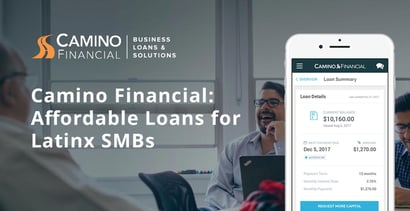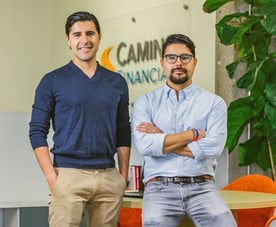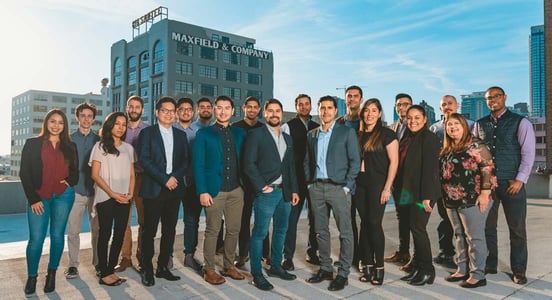

In a Nutshell: Camino Financial specializes in unsecured loans for informal, Latinx-owned small businesses. Its easy online application process and fast decisions allow qualified borrowers to access capital when they need it, helping them maintain and expand their operations. Camino Financial also rewards diligent payments with access to additional funds and extended terms, ensuring the debt is sustainable rather than burdensome. And even if it declines a borrower, Camino Financial has a formal revisitation process that ensures all applicants receive a second look and another opportunity to access the capital they need.
Kenny Salas’s mother came to the United States from Mexico when she was a teenager. She graduated from high school, got married, and opened her first taco restaurant. Over the next 25 years, she went on to open 30 eateries in Southern California. But the physical, emotional, and financial toll of operating those establishments eventually caught up to her. She sold her businesses to her employees and, with her twin sons, moved back to Mexico.
The two boys — Kenny and his brother Sean — never forgot their mother’s struggle as a Latina entrepreneur in America. That experience inspired them to pursue business education at the University of California at Berkeley. Both earned bachelor’s degrees in political economy and also got involved in the Latinx business community. During that time, they met many people who encountered the same problems that their mother had faced.
The pair moved on to Harvard, where they earned MBAs, and then to Wall Street, where they worked for five years in banking and private equity. There, at the nerve center of finance, they gained a new perspective on the financial struggles of Latinx businesses.
“We realized that as well-intentioned and diverse as the investment teams were, there weren’t many Latinx-owned businesses that made more than $20 million a year,” said Kenny Salas, COO and Co-Founder of a lender built with Latinx businesses in mind. “While I very much respect the mission of these funds and what they’re doing, there’s also room for a fund that is more oriented around the base of the pyramid and microlending. That is going to have the most impact.”
Salas and his brother built Camino Financial with a focus on the needs of Latinx small business owners. Camino Financial offers unsecured microloans for informal enterprises that require a relatively modest amount of capital to sustain and scale operations.
“Our mission is to help Latinx-owned microenterprises,” Salas said. “The majority of them are small. We help those informally run businesses acquire capital, formalize their business models, and access more sustainable products.”
Informal Enterprises Benefit from a Fast, Specialized Underwriting Process
One of the most significant ways lenders can help small businesses is to provide them with quick, easy access to capital. Camino Financial’s online application process is designed with that goal in mind.
The application process takes about 10 minutes. Applicants receive an immediate prequalification decision once they submit their application. A loan specialist gathers more information on those who qualify, and applicants submit their financial documentation electronically.
“We use technology such as Plaid so applicants can instantly connect their bank accounts with our database, and we can download the banking transactions, evaluate the debt-to-service ratio,” Salas said. “That goes to the underwriting process, and, ultimately, we can fund deals.”
The underwriting team reviews applications to decide which products best meet the needs of the business, and then sends a loan offer. The loan is finalized within four days of acceptance, but, according to Salas, deals can be completed in as little as one day.
Camino Financial’s operations office is based in Mexico City. Salas said the entire team is proficient in both English and Spanish, ensuring they can service Latinx and many other microenterprises. And the lender’s surrogate income model is specifically designed to evaluate the real income of businesses without formal written records, enabling it to analyze applications and fund borrowers other lenders can’t.
“We decided to lend directly in 2016 and put our equity to work because we realized other lending platforms, through no fault of their own, just don’t understand this market,” Salas said. “This is not their market.”
Timely Payments Earn Borrowers Lower Rates
While Camino Financial does work with small businesses, the vast majority of its loans are microloans. These products range from $5,000 to $75,000, and have different annual interest rates. Repayment schedules on these loans are strictly monthly, and terms start at 24 months and can extend to as long as 36 months.

Kenny and Sean Salas, right, founded Camino Financial to connect small businesses to funding.
Borrowers who repay their debt more quickly will not face any prepayment penalties. That makes Camino Financial’s loans ideal for borrowers who need short-term funds and anticipate paying off the debt quickly. Clients who are diligent in repayment can earn additional funding and extended terms on their loans.
“If a borrower is in good standing with us for nine months, we can add about 20% more capital than what they originally asked for,” Salas said. “We increase the term immediately by six months. So if they’re at 24 months, we’ll take them to 30 months. And we likely reduce the rate.”
Camino Financial specializes in lending to informal small businesses, so it still takes on risk since it doesn’t secure loans with collateral. But the lender is willing to take that risk if it helps those businesses gain a foothold in their marketplace, and rewards them when that risk pays off well for both.
“It’s very much in line with our mission and even our name,” Salas said. “Camino means ‘road’ in Spanish. It is that road of growth as the company matures.”
Forging Long-Term Relationships Through Sustainable Loans
Camino Financial maintains partnerships with other institutions, including Lending Tree, to better understand the behavior of consumers in its market. That gives the company access to outside data on borrowing habits and practices. It also tells Camino Financial where applicants typically go for their loans.
The answer, according to Salas, is that borrowers often accept larger loans from other lenders. Camino Financial’s focus isn’t on maximizing the dollar amount, but on providing products that won’t impose a financial burden on the borrower.
“We typically want to be more conservative on the loan amount and grow with you over time,” Salas said. “We feel it’s more sustainable for businesses and for us.”

The Camino Financial team follows up with applicants who were initially denied.
Even when the lender denies an application, that isn’t necessarily the end of the road for the potential borrower. Camino Financial uses a formalized revisitation process and reexamines rejected applications. If they now qualify for a product, a representative will reach out and continue the conversation.
“If you look at our new account volume for the last two months, a third of them were revisited applications,” Salas said. “Taking a second look at these deals is important to us.”
The practice is effective in driving business for Camino Financial, but it’s equally useful for struggling businesses. The formal reevaluation process was motivated by the increasing need for support during the Covid-19 pandemic closures and lockdowns. Camino Financial can provide them with funds to weather the pandemic and resume business as economic activity returns to normal.
Data Analytics Help Underbanked Small Businesses Achieve Financial Stability
Camino Financial was founded to give informal, Latinx-owned businesses access to products they couldn’t attain through mainstream, traditional lenders. Salas, his brother, and the rest of the Camino Financial team are dedicated to making an impact by expanding financial inclusion. However, they recognize that there is still a long road ahead.
“I hope one day that institutions like Camino Financial are not required, but the reality is, there’s a history we need to learn and appreciate,” Salas said. “That history has created barriers for certain segments of the market and certain demographic groups. We must educate ourselves on that and give these communities the support they need. We want to, at least, make the playing field a little bit more level.”
Camino Financial has adapted its analytics and data set in response to evolving needs in an economy affected by public health concerns. Previously, both focused on industry-based evaluations, but greater weight is now placed on geography.
“We need to pay attention to the unique elements happening in every state,” Salas said. “I think that is a new level of digging into the data and refining our model. I think this is just pushing our analytics to the next level.”
Advertiser Disclosure
BadCredit.org is a free online resource that offers valuable content and comparison services to users. To keep this resource 100% free for users, we receive advertising compensation from the financial products listed on this page. Along with key review factors, this compensation may impact how and where products appear on the page (including, for example, the order in which they appear). BadCredit.org does not include listings for all financial products.
Our Editorial Review Policy
Our site is committed to publishing independent, accurate content guided by strict editorial guidelines. Before articles and reviews are published on our site, they undergo a thorough review process performed by a team of independent editors and subject-matter experts to ensure the content’s accuracy, timeliness, and impartiality. Our editorial team is separate and independent of our site’s advertisers, and the opinions they express on our site are their own. To read more about our team members and their editorial backgrounds, please visit our site’s About page.





